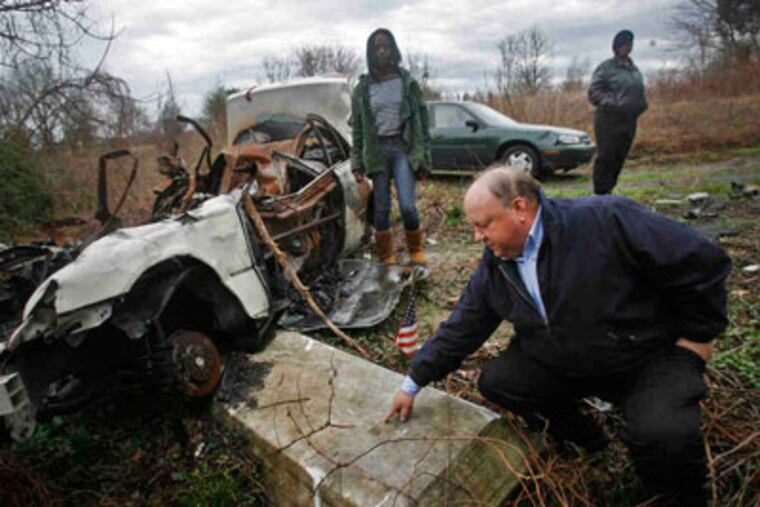Mount Moriah Cemetery shuts down unexpectedly
AMID BROKEN and fallen headstones, not far from a burned-out car sitting atop a veteran's grave, near a graffiti-marred wall, Sabrina Stokes mourns her son.

AMID BROKEN and fallen headstones, not far from a burned-out car sitting atop a veteran's grave, near a graffiti-marred wall, Sabrina Stokes mourns her son.
She can ignore the discarded tires and overgrown weeds, the condom wrappers, even the dead dog decomposing against a mausoleum's wall. The neat grave that memorializes Muhammad, only 20 when he died, stands in marked contrast to many around it at Kingsessing's Mount Moriah Cemetery.
"When I placed my son here, I planned for him to be resting in peace," said Stokes, 48, of North Philadelphia.
Now, it seems, he doesn't even have that.
Earlier this month, Stokes learned that Mount Moriah had unexpectedly shut down. She found out via a recording left on the office answering machine.
The terse message states simply that the cemetery is closed and not accepting orders for funerals or burials. "No further information is available at this time," it intones twice.
So, Stokes and so many others are left to wonder and worry about what will become of the historic resting place that once held the remains of Betsy Ross. Will it be left to fall into further ruin? Will it be parceled off and sold?
What happens to all the plots already purchased? What about the stones that are paid for and not placed?
"I can't get in touch with anybody. It's constantly on my mind," Stokes said. "It was hard enough to bury my son. Now neither of us can rest."
Mount Moriah sprawls across more than 380 acres in Southwest Philadelphia, crossing Cobbs Creek Parkway into Yeadon, Delaware County. Founded in 1855, it is the final resting place of more than 85,000 people, including more than 5,000 veterans. Notables buried there include the first owner of the Phillies and the first mayor of Philadelphia.
Some small pockets of the cemetery are still maintained, like the 96 graves of Civil War soldiers that are watched over by the Military Order of the Loyal Legion of the United States. Drew Techner, a member of the Loyal Legion, fears that that could change with the closure.
"It's going to get wild and overgrown," said Techner, who also has family members buried in Mount Moriah. "It's disrespectful to the remains of these soldiers who died having served our country. Their final resting place is going to be desecrated by neglect."
Dan Callahan doesn't want to see that happen. He's a member of the Friends of Mount Moriah Cemetery, a group of concerned citizens who are eager to restore the cemetery.
"It's not so far gone that it can't be restored," he said. "All it takes is a little more effort."
Or a lot of effort. In the three years since Callahan has been frequenting the cemetery, he's seen prostitution activity and drug use in areas that are overgrown and somewhat secluded. A member of his group was once chased from the cemetery by a pack of wild dogs. Someone leaves food for the animals among the graves.
"The most pressing problems are dumping and dogs," said Callahan, who pointed out a burned-out car, bags of trash and a discarded sofa. "I'm optimistic it's going to be improved."
But before that can happen, his group needs permission to enter the property since it is privately owned. That's a problem: No one knows, or will admit to being, the cemetery's owner.
A few years ago, when Temple professor Andy Waskie helped found Friends of Mount Moriah, he found the employees at the cemetery's management office unwelcoming at best.
"They steadfastly refused to work with us," he said. "They wouldn't even reveal who owned it. It was very hard because we couldn't effect any change."
The cemetery's office is now empty and locked.
Even when the office cooperated, volunteers found themselves frustrated. One Saturday, Waskie said, he and other volunteers removed more than 90 tires from the cemetery grounds. Within six months, even more tires had been dumped there.
"Any work you did was going down a rat hole," he said.
One problem is that it's impossible to secure the cemetery. Its gates, at 62nd Street and Kingsessing Avenue, are open and broken. The surrounding fence is knocked down in places, offering easy access to the grounds.
Still, that doesn't stop some people from worrying that they could be turned away.
Denea Beyah, 37, travels from Plymouth Meeting to visit her husband, who was buried in Mount Moriah in 2008. She's worried she'll arrive one day to find the gates locked and access to her husband blocked.
"It's so old, you never think it's going to close," she said. "I wanted to be buried with my husband, and to think that that might not happen is disturbing."